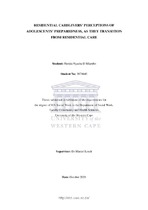| dc.description.abstract | The National Policy on Orphans and Vulnerable defines an orphan as a child, who has lost one, or both parents, and is under the age of 18, while a vulnerable child is one, who is in need of care and protection. The Orphans and Vulnerable Children (OVCs) are placed in residential childcare facilities (RCCFs), such as children’s homes, shelters, safe havens, or any other alternative form of care. They are provided with psychosocial support, depending on the facility, in which they are placed.Failure to provide proper and specialised care by the caregivers could prove harmful to the overall wellbeing of the child, resulting in children with developmental difficulties, poor interpersonal relationships, mental health difficulties, behavioural difficulties, and poor academic achievement. | en_US |

